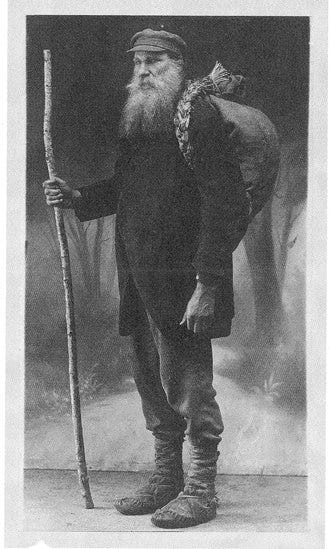In Lithuania, March 16 is celebrated as Knygnešio diena, or the Day of the Book Smugglers, to commemorate the birthday of Jurgis Bielinis, a newspaperman who created a secret distribution network in order to smuggle banned Lithuanian books into the country. The ban was a result of the Russian occupation of Lithuania, which brought with it militaristic efforts to enforce Russification—including a mandate to replace all Lithuanian-language works printed in the Latin alphabet with Cyrillic works.1
Knygnešiai (Lithuanian book smugglers) smuggled illegal books and periodicals across the border. The number of such publications kept increasing despite strict sanctions and persecution of the activists. The ban created a well-defined and organized opposition to Russian rule and culture—the opposite of its original intent.
The Lithuanian press ban was in force from 1865 to 1904 within the Russian Empire. which controlled Lithuania. The ban arose after the failed January Uprising of 1863,2 taking the form of an administrative order in 1864, and was not lifted until 24 April 1904. During the years of the ban, 3,047 people (829 smugglers, 859 distributors, and 1,359 persons possessing banned books) were arrested in connection with the ban.
The Russian courts reversed two convictions in press ban cases in 1902 and 1903. 3
In 2004 book smuggling was recognized by UNESCO as a unique activity and a phenomenon distinctive only to Lithuania without equal in the world.
The Lithuanian Book Smugglers Museum, Ustronė estate, tells the story of the press ban (1864-1904) and the unstoppable battle of Lithuanians for the word of the mother tongue. This is the only museum in Lithuania and around the world about book smuggling.4
The book, Words on Fire, by Jennifer A. Nielsen, tells this story. 5
Schwartz, Dana (30 March 2015). "The Fascinating History of Lithuania's Day of the Book Smugglers." Mental Floss.
This was an insurrection principally in Russia's Kingdom of Poland aimed at the restoration of the Polish–Lithuanian Commonwealth. It began on 22 January 1863 and continued until the last insurgents were captured by the Russian forces in 1864.
A. S. STRAŽAS. LITHUANIA 1863-1893: TSARIST RUSSIFICATION AND THE BEGINNINGS OF THE MODERN LITHUANIAN NATIONAL MOVEMENT. LITUANUS: LITHUANIAN QUARTERLY JOURNAL OF ARTS AND SCIENCES 42, No.3 Fall 1996. J.
Nielsen, Jennifer A. 2022. Words on fire. Scholastic Books, 2019.






Book (document) smuggling has been going on forever. In fact, information-smuggling is the world's second oldest profession. In the late 1980s I had a controlled asset persuade her 87 year old mother to smuggle out of Eastern Europe a carbon copy of a computer program that would give the West a minimum 30-day notice on a Soviet invasion.
A few months later I recruited an Eastern Bloc source who told us of a Russian-gauge rail line that extended two hundred kilometers further west than any previously known. Tanks aren't Oldsmobiles, for long distance they have to ride on trains, and Russia had a unique gauge not shared with any other country (for the nit-pickers, yes, I know there are exceptions). There were dozens of such efforts in the Eastern bloc in the late 1980s, because Russians never learned that winning the hearts and minds of subjugated people does not proceed well when it begins with lashing the back.
That's an inspiring story and one that we know too little about. I certainly had never heard of that ban before, but book banning has a long, dark history and one that we need to be aware of and fight against.